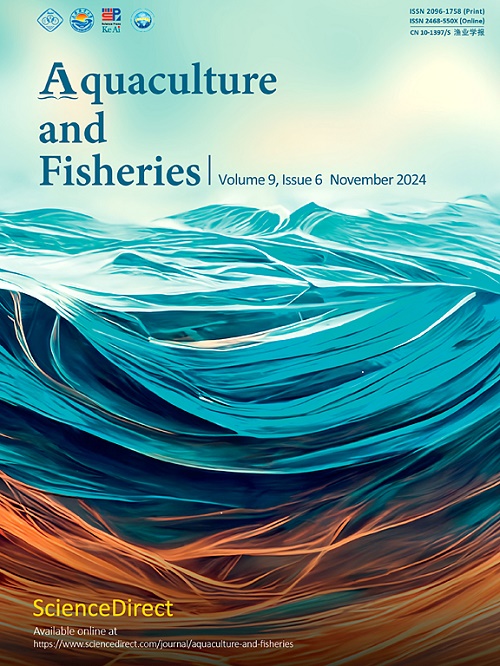Assessment of different grass species extracts as source of micronutrients in prawn Macrobrachium rosenbergii feeds
Q1 Agricultural and Biological Sciences
引用次数: 0
Abstract
The present research is an attempt to screen five perennial indigenous grass species for their biochemical constituents seasonally for one year in order to determine the exact season for the harvest of the target species which will be used as feed ingredient. Among them, Cynodon dactylon has shown better result compared to other grass species and was hence incorporated as micronutrient in the formulated feed. Macrobrachium rosenbergii culture was carried out by feeding conventional and formulated feed (prepared from grass species) in tanks and ponds filled with spring water for 180 days in 2020 in the Eastern Ghats region of Koraput district, Odisha, India. Two treatments namely T1 and T2 having four replications each were supplied with commercial feed and formulated feed. Feeds were applied as per the body weight of prawns at 20% for the 1st month, 15% for the 2nd month, 10% for the 3rd and the 4th month, 5% for the 5th month and 2% till the end of the experiment. The water temperature, pH, dissolved oxygen, transparency, nitrate, phosphate, silicate, Chl a in the culture tanks and ponds were monitored fortnightly. ANOVA results between all the water parameters for both culture tanks and ponds showed significant variation (P < 0.05). The survival rate (77.0% ± 0.89%), daily growth rate (0.233 ± 0.05) g/day, specific growth rate (4.657% ± 1.04%) per day and condition index (2.638 ± 0.05) were found to be highest in prawns fed formulated feed. The feed conversion ratio varied from (2.03 ± 0.05) to (2.68 ± 0.04). Benefit cost ratio of field culture were 1.46 with yield of 702 kg/ha in conventional feed and 1.75 with yield of 950 kg/ha in formulated feed respectively. The study proved grass extracts to be efficient micronutrients for prawn feed which can be easily adopted in prawn production.
不同草种提取物作为对虾饲料中微量元素来源的评估
本研究尝试对五种多年生本地草种的生化成分进行为期一年的季节性筛选,以确定用作饲料原料的目标草种的确切收获季节。其中,禾本科牧草(Cynodon dactylon)与其他草种相比显示出更好的结果,因此被作为微量营养素添加到配方饲料中。2020 年,在印度奥迪沙邦科拉普特县的东高止山地区,通过在装满泉水的水箱和池塘中投喂常规饲料和配方饲料(由草种配制),进行了为期 180 天的大鳞鲃养殖。两个处理,即 T1 和 T2,各有四个重复,分别提供商用饲料和配方饲料。根据对虾的体重,第 1 个月投喂 20%的饲料,第 2 个月投喂 15%的饲料,第 3 和第 4 个月投喂 10%的饲料,第 5 个月投喂 5%的饲料,直到实验结束投喂 2%的饲料。每两周监测一次养殖池和池塘的水温、pH 值、溶解氧、透明度、硝酸盐、磷酸盐、硅酸盐和 Chl a。养殖池和池塘中所有水体参数之间的方差分析结果显示差异显著(P < 0.05)。发现投喂配方饲料的对虾存活率(77.0% ± 0.89%)、日生长率(0.233 ± 0.05)克/天、日特定生长率(4.657% ± 1.04%)和体质指数(2.638 ± 0.05)最高。饲料转化率从(2.03 ± 0.05)到(2.68 ± 0.04)不等。大田养殖的效益成本比分别为 1.46(传统饲料产量为 702 千克/公顷)和 1.75(配方饲料产量为 950 千克/公顷)。该研究证明,草提取物是对虾饲料的高效微量营养素,可在对虾生产中轻松采用。
本文章由计算机程序翻译,如有差异,请以英文原文为准。
求助全文
约1分钟内获得全文
求助全文
来源期刊

Aquaculture and Fisheries
Agricultural and Biological Sciences-Aquatic Science
CiteScore
7.50
自引率
0.00%
发文量
54
审稿时长
48 days
期刊介绍:
 求助内容:
求助内容: 应助结果提醒方式:
应助结果提醒方式:


